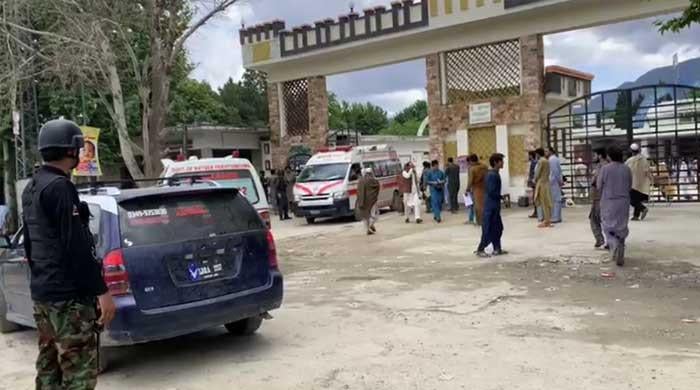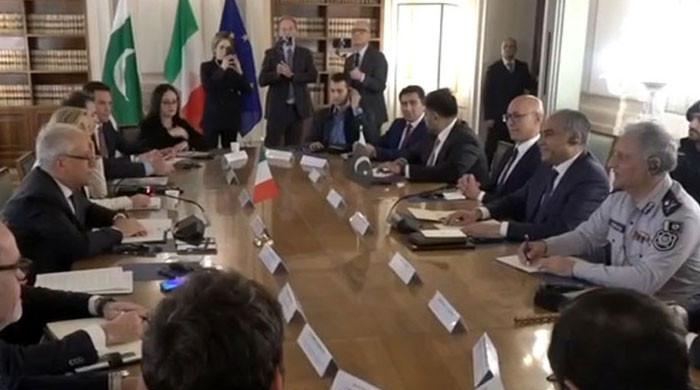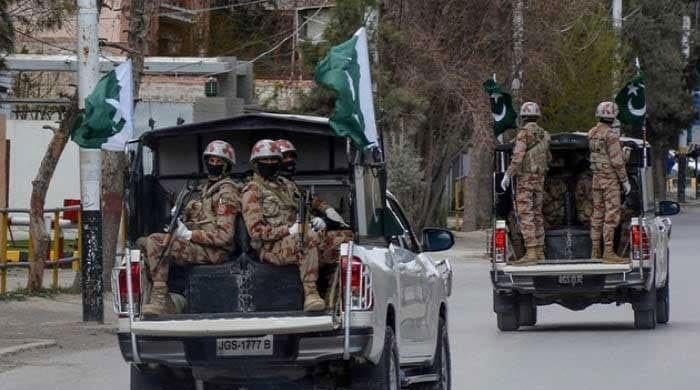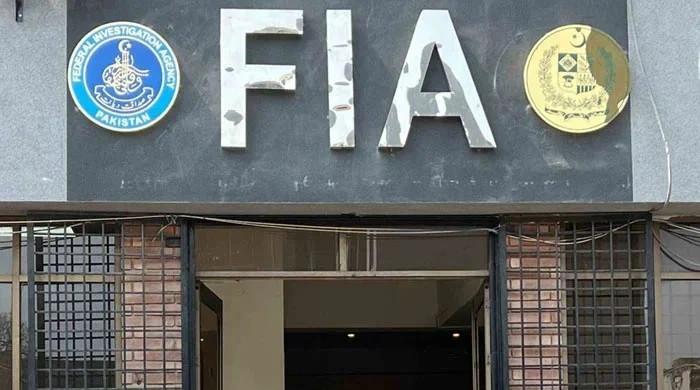Powerless but not voiceless: Uncovering education woes of Khairo Dero
Khairo Dero village, comprising 3,700 souls in district Larkana, united and challenged the appointment of one government officer but to no avail
March 31, 2017
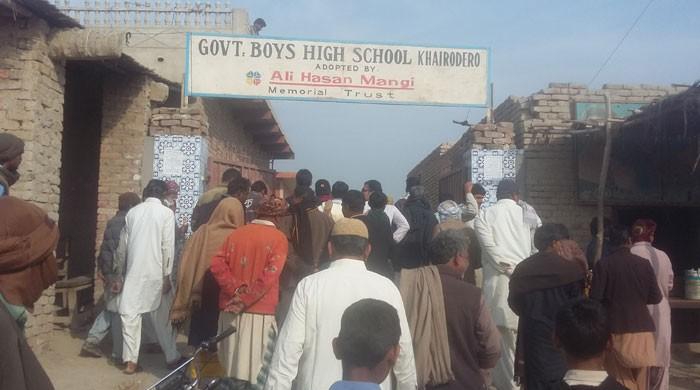
KARACHI: Corruption in government departments is no secret, however what often remains hidden is the impact it has on lives of common people.
Ghost schools, ghost teachers, appointment letters, lack of accountability are just a few examples of how corruption has almost become a norm in the department. While Sindh government has time and again promised to make high levels of literacy a reality and increased the budget allocated for education yet the province witnessed a dip in learning scores, according to Alif Ailaan annual report on District Education Ranking 2016.
Moreover, just 23 per cent of all schools in the province have basic facilities such as electricity, water, toilets and boundary walls, the report added.
In such a scenario, education seems like a distant dream. However, people in one village united for the better and brighter future for their children to change the status of one school but to no avail.
Khairo Dero village, comprising 3,700 souls in district Larkana, united and challenged the appointment of one government officer, who is alleged to thwart education in the area. However, the struggle bore no fruit as officer was removed temporarily but has come back after being removed temporarily for a month.
Towards change
Education had remained a far-flung dream for people of Khairo Dero. The schools in the area were operational only on paper, the building remained empty and school’s staff continued to pocket money for doing no work, as claimed by people of the area.
In 2014, one of the schools, Government Boys High School, was adopted by the trust, which also hired five teachers, built a library and increased the number of children in the school from zero to 75.
“The school’s position is much better than before as now teachers at least come [to the school to teach] and so do the students,” said one of the residents of village. Level of education is also better than before. “We are satisfied [with the standard of education now].”
“Previously, the school was a murdakhana [morgue]”, said another resident Abid Hussain, adding before there was nothing and the master would come to school at 12pm but now the situation had changed.
Initially, the young boys of the village were seen hanging around the streets but now they are found in classrooms, said a female student of class 7, who is studying in another school in Khairo Dero adopted by the trust. Thanking Mangi for paving a way for their future, the girl remarked, “I am very thankful for Baji Naween she is very good to us.”
Obstacles to education
However, the trust claimed the main obstacle in the way of making education a reality was the school’s incompetent staff especially the school’s headmaster, Abdul Qadir Bhutto.
“Many government teachers aren’t used to working because of the lack of proper supervision,” said Mangi Trust’s founder and managing trustee Naween Mangi while speaking to Geo.tv. “That’s why it’s not uncommon for headmasters like Qadir to come late, fail to maintain school discipline and fail to monitor government teachers.”
She further said that school received Rs100,000 funds by School Management Committee (SMC) for the school. About Rs45,000 were spent on buying solar panels to generate electricity in the school and the headmaster conveniently took them to his house for ‘security purposes’, she added.
The trust employees wrote a letter to the education department and filed a complaint against Bhutto. Initially, there was no response, said Mangi, however after a few days the headmaster brought the equipment back but locked it in his bathroom. “He did not even let us see what equipment he had brought back,” said Mangi.
Another time, the trust’s staff found the library they built torn down, she remarked, adding when the trust’s staff saw this they removed their books to protect them from being vandalised. Moreover, a member of community, who was with Bhutto, told the trust that the headmaster has withdrawn Rs44,000 funds. “The headmaster refused to provide bills or physical evidence of what he did with those funds.”
A resident of the area, Abid Hussain also hinted towards the corruption of the headmaster while speaking to Geo correspondent. Hussain alleged that the headmaster took the new gate of the school. “Baji bought plates worth Rs50,000 to Rs60,000 which also went missing,” he remarked.
The head master was also asked to report to Education Secretary Sindh in an order dated December 6, 2016, but he never went. To make matters worse, the head master locked the children inside their class rooms on January 23, this year, and threw the teachers, hired by the fund, outside the school and locked its gate, said Mangi.
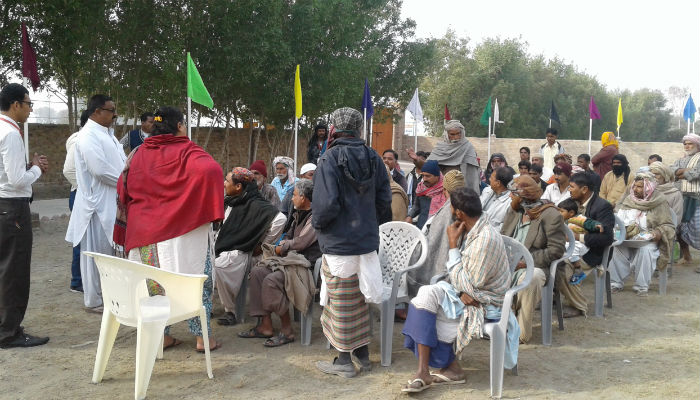
Collective action
Fortunately, the school’s location is such that people passing by saw all that was happening, remarked Mangi. A crowd gathered and wanted to know what Bhutto was trying to achieve. According to Mangi, Bhutto responded to the people by saying that he does not want school to be adopted. The people replied that he is just an employee of education department and should respectfully leave the village, she added.
The enraged people, including about 50 students and their parents, then went to the Education Director Secondary Larkana’s office in a bus. However, when the department officials saw such a crowd they were alarmed and education director, Razia Pathan, refused to come out of her office.
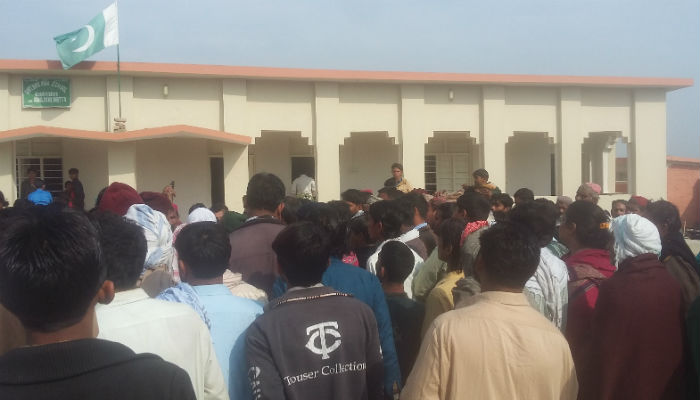
Later, Pathan agreed to meet Mangi and other members of the trust in private. Pathan told them that she can’t take a decision on the matter as it is pending with the Secretary Education,” according to Naween.
While speaking to Geo.tv, Pathan said “He [Bhutto] was summoned by Secretary Education; I didn’t have any say in the matter.” Staff members who are to report to the secretary are temporarily suspended, she explained, adding that even after suspension they are paid salaries.
Afterwards, Pathan eventually caved into the pressure the community and told the DOO to write a letter telling Bhutto to discontinue his services from this particular school.
For the first time, the collective action and bravery shown by the people of the village led to a change.
However, the letter issued by the education director had its flaws. “The sloppy letter refusing him [Bhutto] to come wasn’t typed or stamped,” remarked Mangi. When asked to do so, another education department official wrote on it with a different coloured pen and then stamped it. Due to two different colours it gives room for the writer to not own it, she explained and shared a copy of it with Geo.tv.
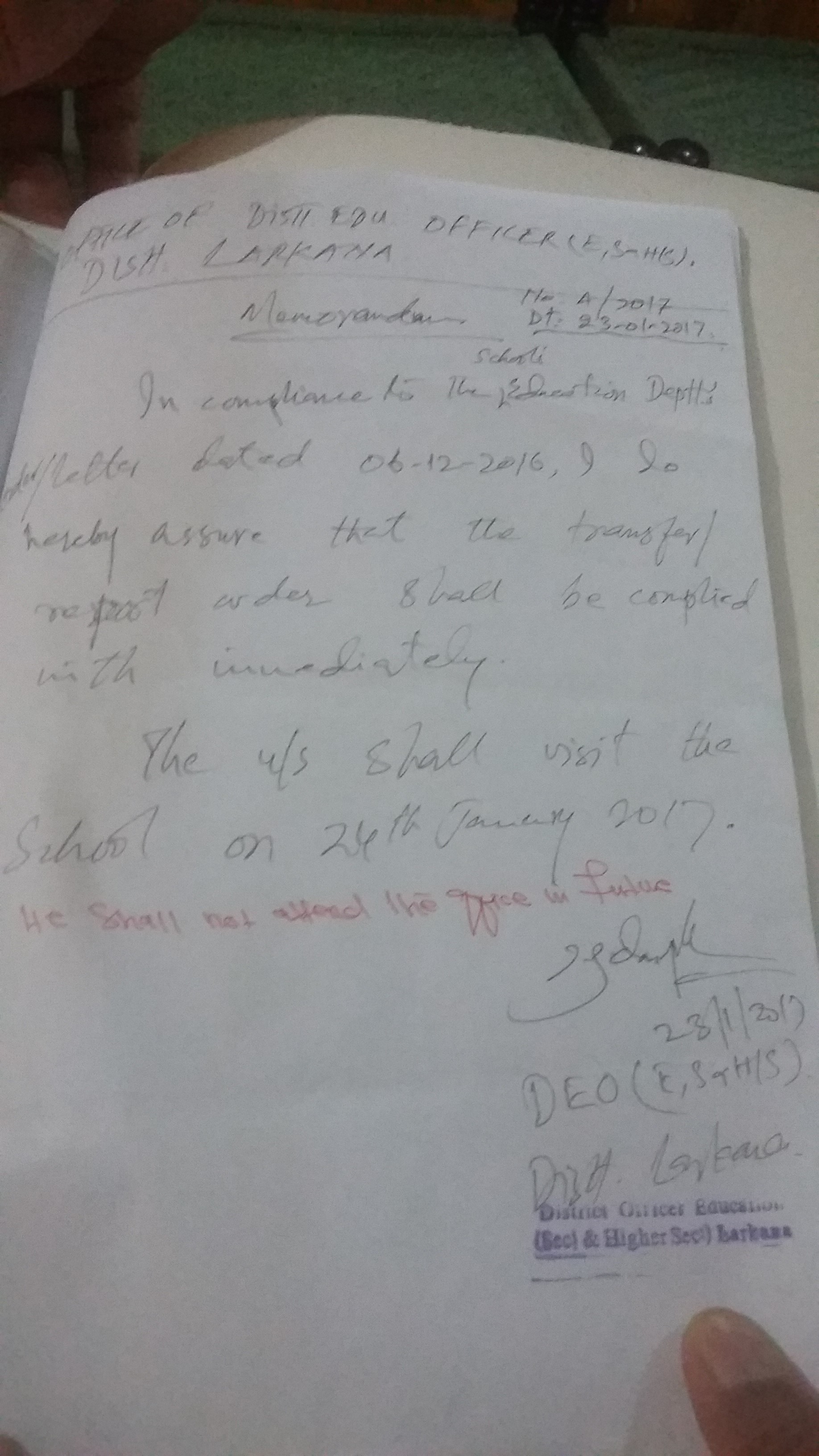
The next day after the letter was issued Bhutto came to the school but did not interact with the staff. Soon a temporary headmaster was appointed from the school’s staff in his place, said Mangi, adding “there was no formal announcement that Bhutto has been removed.”
More was to come for people, as Bhutto showed up to the school on March 10 and claimed he had been ordered by District Officer to do so, according to Mangi. “The secretary must explain what action he has taken against such an individual,” said Mangi in a text sent to Geo.tv.
When Bhutto was contacted on the matter, he remarked “I have nothing to say.” When asked again, his long silence ended with “I have been told by other officers to stay quiet”. Moreover, he said that he has left the Khairo Dero school.
However, Mangi said that Bhutto had left the school temporarily but has been coming back regularly. Even the education director has no clue as to how or why Bhutto is back in the school, said Mangi.
'Silent facilitator'
To help resolve this issue even Sindh Education Foundation (SEF) remains powerless.
Adopt A School programme senior officer AbduI Samad spoke about the role of SEF in helping schools. SEF's main responsibility is to facilitate the adoption of schools. This includes paperwork and help adopters in every way possible. As for the day-to-day problems, SEF remains a 'silent facilitator'.
Adopters share their problems or request for development work with SEF, which then forwards the petition to Director Schools or Education Secretary. However, SEF does not have the authority in such matters. It's prime responsibility is facilitating adopting process.
Managing Director SEF Naheed Durrani remained unavailable to comment on the matter.
Department in turmoil
Sindh is going through a mini-crisis in terms of Secretary Education. The current secretary Abdul Aziz Uqaili was appointed a two weeks ago and was in Australia at the time of his appointment. He was expected to return on March 20 and take the charge then.
Around two months ago, former secretary Fazlullah Pechuho was removed from the post and he was replaced by Jamal Mustafa Syed. Moreover, the post of Education Secretary for colleges has also been lying vacant since March 3.
This is not the first time the education system of the province is going through turmoil, before Pechuho was appointed the Secretary Education was changed nine times from 2008 to 2011, according to Wilson Centre report, ‘Pakistan’s Education Crisis: The Real Story’. The constant changes in appointments tend to hamper accountability and prevent implementation of various reforms.
With no one heading these posts, the question truly remains who the people from different villages and town contact for their problems?
Alongside, about millions of rupees were seized from the house of a grade-16 official of the education department, Bachu Mal, on March 13, this year.
According to National Accountability Bureau (NAB) press release, the official was in possession of prize bonds worth Rs40 million, two flats each in Mirpurkhas and Hyderabad, six apartments in Shaheed Atiqullah Height, another plot in Qasimabad and two vehicles worth Rs2.5million.
Paving a way forward will prove to be quite arduous unless the government overcomes the menace of corruption.






